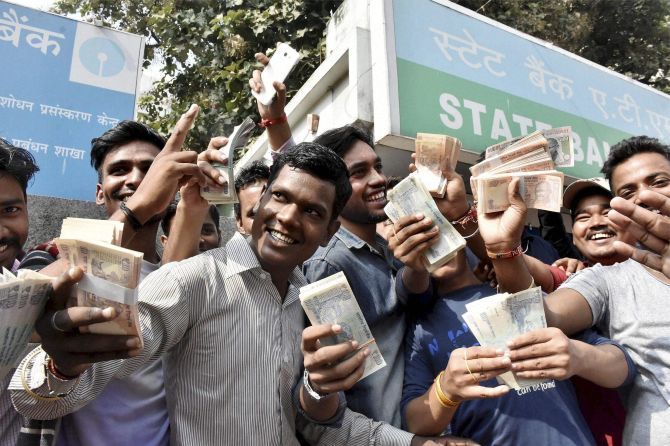'It has been inconvenient, yes, but the public has borne it largely with good humour.'
'There have been long queues, but thanks to decades of shortage-economy socialism, we are used to standing in line for everything, and filing out some damned forms in triplicate,' says Rajeev Srinivasan.

Enough and more has been said about the impact of demonetisation, as we head into Week 3 after the End Of Civilisation As We Know It.
One of the more interesting was from Ruchir Sharma, a well-known emerging-market fund manager. If you read Sharma's piece (external link), you get the feeling he is missing the forest for the trees. He appears to be of the opinion that the act is cruel and unusual punishment for the masses, and not likely to remove all the black money from the system.
I think he's wrong on the first, because it has been inconvenient, yes, but the public has borne it largely with good humour. There have been long queues, but thanks to decades of shortage-economy socialism, we are used to standing in line for everything, and filing out some damned forms in triplicate.
On the second point, he is right. Corruption and black money will never be eliminated entirely: people are good at inventing new ways of gaming the system. That's also thanks to socialism and a general propensity, therefore, to do jugaad.
But the overall outcome (the forest) is positive, though the details (the trees) may be less obviously so.
The effect of demonetisation has been largely, of course, to drive black money above ground. But there are several interesting side-effects. One is the uncomfortable realisation that this can happen again, which is a deterrent to future sinners.
Second is the deterioration in the availability of terrorism funds, which resulted in a cessation of stone-throwing in Jammu and Kashmir. That clearly shows that it was a command performance by the ISI, giving the lie to #SocialJusticeWarriors’ claims.
The third is the demonstration, once again, that the average Indian is not swayed by the Lutyens brigade. In keeping with the comically inaccurate predictions of the media regarding the Modi, Trump and Brexit elections, their doom and gloom scenarios did not come to pass, and it was a remarkably quiet and orderly transition. The average Indian confounded the MSM by showing great fortitude.
The fourth is a monumental outbreak of schadenfreude among the public. As much as we were inconvenienced, it was comforting to know that the high and the mighty were put to far more trouble.
The bhagiratha prayatnam that the well-off were forced to go through -- such as pleading with their maids and servants to deposit old notes into their accounts -- was a treat to watch. News of bundles of burned or shredded notes in various garbage bins showed how some ill-gotten wealth was literally going up in smoke.
The sight of various politicians squirming was especially entertaining. The Communist finance minister of Kerala was upset. The ever-agitated Mamta Banerjee was beside herself with annoyance. Manmohan Singh, who presided over the most corrupt and venal government ever in India, and possibly in the history of the universe, was moved to suggest that 'it is a case of organised loot and legalised plunder.' Irony died a thousand deaths.
But the most risible of all was that intrepid anti-corruption advocate, Arvind Kejriwal. He was hopping mad and kept up a barrage of tweets (when does he get any time at all to actually govern?). A sample: 'I am v sad that FM has plainly refused to even review and consider rollback. Modi govt has lost connect wid people n has bcome v insensitive' [sic] {9:45am, 18 Nov 16}
The fifth side-effect is the disappearance of a number of causes from the front pages, Najeeb, the cause celebre 39-year-old missing JNU student. Or even the celebrated Kanhaiya, also of JNU. Clearly, Pink Floyd was right: 'Money, it's a crime... but hey, don't you touch mine.' We now know where the priorities of our #AltLeft lie: saving their own skins is job #1.
The sixth is the sudden popularity of electronic money. A lot of people have started paying through Paytm and other such gateways, because they obviate the need to carry cash around. The Universal Payment Interface has not yet become very popular, although the State Bank of India just released its own app, which will enable you to transfer funds without knowing account numbers and with no transaction fees.
Therein lies the final side-effect. If these payment apps are to become truly popular, there are two pre-conditions: More people must be literate, have smartphones, data connections, and access to app stores such as Google Play. And they must be provided these apps in their native languages, not just English and Hindi.
There is an unfortunate tendency on the part of government to assume that everyone will transact in Hindi. That is simply not possible: A significant proportion of the public will be more comfortable in their own languages, those 18 or so defined as national languages in the Constitution.
It would be interesting to see detailed statistics of what percentage of the public chose non-Hindi and non-English language apps.
I bet that as many as 30 per cent of the public will pick other languages. That would be definitive and first-hand proof of the glorious diversity of India, which persists, despite the valiant efforts of Nehruvian Stalinists to squeeze it into a monotheistic straitjacket.
Demonetisation is therefore metaphor and it suggests, simply, that Bharat lives on. Despite a veneer of modernity, as Dharampal suggested, an invisible Bharat, eternal and spiritual, is like a subterranean river that yet moves us profoundly.
More power to it.
IMAGE: Indians with money withdrawn from an ATM in Patna. Photograph: PTI Photo











 © 2025
© 2025